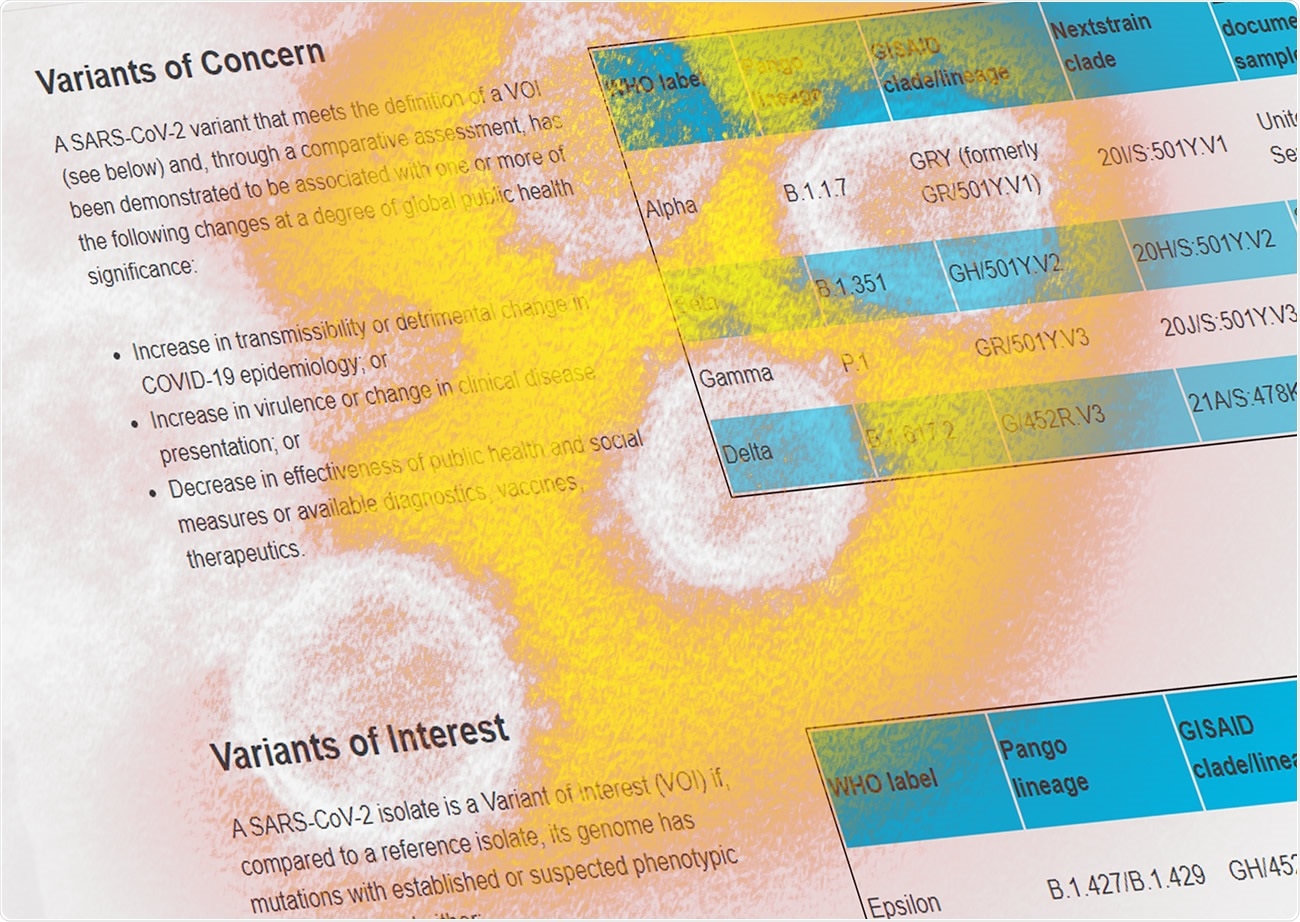Severe acute respiratory syndrome coronavirus 2 (SARS-CoV-2) continues to spread globally, infecting over 172 million people, and claiming the lives of more than 3.7 million individuals.
During the past few months, new variants of concerns have emerged and come to the fore. There is known to be increased transmissibility with these variants and the possibility for evasion of the body's immunity. In addition, they threaten the effectiveness of vaccines designed to combat SARS-CoV-2.
Now, the World Health Organization (WHO) has assigned simple and easy-to-say labels for key variants of SARS-CoV-2 using letters of the Greek alphabet. The health agency selected these labels after a thorough review of many potential naming systems.

The WHO expert group recommended using letters of the Greek alphabet, which will be easier and more practical to discuss by non-medical audiences.
Globally recognized health experts ensured the names can be used for the new variants, previously known as B.1.1.7, B.1.351, P.1 and the B.1.617.2.
These labels are not intended to replace existing scientific names, but rather to allow people to pronounce them easily. To date, the variations were named after the places where they first appeared, which is both discriminatory and biased.
"To avoid this and to simplify public communications, WHO encourages national authorities, media outlets, and others to adopt these new labels," the WHO emphasized.
Simple labels
According to the WHO website, the new terminology includes labels for both variants of concern and variants of interest.
Variants of concern are SARS-CoV-2 variants that meet criteria and have been linked to one or more changes. These include increased transmissibility, increased virulence or chance in the clinical disease process, and a decrease in the effectiveness of vaccines and therapeutics.
VOCs include the B.1.1.7 variant, which emerged in the United Kingdom; the B.1.351 variant, first reported in South Africa; the P.1 variant, which occurred in Brazil; and the most recent B.1.617.2 variant, which was found in India.
As a result, B.1.1.7 is now going to be called Alpha, B.1.351 will be Beta, B.1.617.2 will be Gamma, and P.1 will become Delta.
Meanwhile, the variants of interest (VOI) are those with genome mutations with established or suspected phenotypic implications. These include the B.1.427/B.1.429 variant, now called Epsilon, the P.2 variant now called Zeta, the B.1.525 variant now called Eta, the P.3 variant now called Theta, the B.1.526 variant now called Iota, and the B.1.617.1 variant called Kappa.
SARS-CoV-2 mutation
In order to adapt to changes in their environment, viruses undergo mutations over time. However, some changes may affect the characteristics, properties, and transmissibility of the virus. The associated severity may pose a global health threat.
Also, the effectiveness of approved vaccines may decrease as viruses mutate. It is possible for new variants to evade the immune system and antibodies developed during natural infection or vaccination.
Health officials across the globe have been monitoring SARS-CoV-2 variants throughout the pandemic. In December 2020, the United Kingdom reported a new variant of concern spreading since September 2020, which spreads faster.
"WHO and its international networks of experts are monitoring changes to the virus so that if significant mutations are identified, we can inform countries and the public about any changes needed to react to the variant and prevent its spread," the health agency noted.
There are now systems working globally to detect emerging variants. By being prepared and monitoring the variants, we can mitigate the spread of the virus. Still, WHO emphasizes the importance of basic infection prevention measures, such as handwashing, avoiding contact with others, and wearing a facemask.
- World Health Organization (WHO). (2021). WHO announces simple, easy-to-say labels for SARS-CoV-2 Variants of Interest and Concern. https://www.who.int/news/item/31-05-2021-who-announces-simple-easy-to-say-labels-for-sars-cov-2-variants-of-interest-and-concern
- World Health Organization (WHO). (2021). Tracking SARS-CoV-2 variants. https://www.who.int/en/activities/tracking-SARS-CoV-2-variants/
Posted in: Disease/Infection News
Tags: Antibodies, Coronavirus, Genome, Immune System, Mutation, Pandemic, Respiratory, SARS, SARS-CoV-2, Severe Acute Respiratory, Severe Acute Respiratory Syndrome, Syndrome, Therapeutics, Virus

Written by
Angela Betsaida B. Laguipo
Angela is a nurse by profession and a writer by heart. She graduated with honors (Cum Laude) for her Bachelor of Nursing degree at the University of Baguio, Philippines. She is currently completing her Master's Degree where she specialized in Maternal and Child Nursing and worked as a clinical instructor and educator in the School of Nursing at the University of Baguio.
Source: Read Full Article
